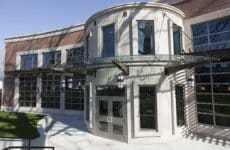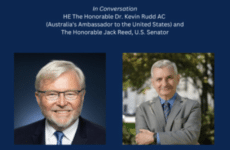By: Kim Osborne & Elisabeth Steinhardt
Posted In: News

Photo credit: Salve Today
For many of us, traveling to another country symbolizes a luxurious, jet setting lifestyle, but sometimes it can be a very eye-opening experience.
After hearing the inspiring convocation address of Fr. Angelo D’Agostino, founder of the first AIDS orphanage in Africa, at last year’s convocation ceremony, members of the Salve community felt compelled to get involved in the AIDS effort in Africa. They accepted D’Agostino’s invitation to visit the Nyumbani orphanage in Kenya. “It’s not like a visit to Disneyworld,” said Dr. Anthony LoPresti, a religious studies professor at Salve and one of the four faculty members to take a weeklong, exploratory visit to Kenya this past summer. In 2010, 20 million babies will be orphaned in Africa, over 23 million people in Africa alone have AIDS and Kenya has the third highest number of AIDS in the world. There are over 25 million people in Africa who are HIV positive. Most of the people dying of the disease are between 20-50 years of age, leaving behind many children and elders. Nyumbani, a hospice village for children suffering from AIDS, relies on its 70 staff members and 20 volunteers. The volunteers assist the children with bathing themselves, getting dressed, giving them their medicine “cocktails” twice a day and helping them survive from day to day. Lopresti said that Nyumbani orphanage has 94 residents and is just one of D’Agostino’s efforts to help children suffering in Africa. D’Agostino also reaches out to about 2000 children in the slums. “They are sub-human living conditions,” said LoPresti, who was saddened by what he saw while visiting the slums of Kenya. According to LoPresti he saw homes with no ceilings, walls or plumbing. He said that the environment is far from healthy, with no city services to provide proper disposal of trash, raw sewage and human wastes. In spite of the horror that he witnessed while in Kenya, LoPresti said that beauty still exists among the poverty, sickness and death. “The people there have a very strong spirit and very proud traditions,” said LoPresti. Although the people of Kenya have continued to keep their spirits high, the problem is still a devastating one. Many Africans cannot afford the drugs that people in other countries use to manage living with the disease. The poverty and poor nutrition makes living with the disease more difficult for those in Africa. Without proper nutrition it is impossible for those who actually have access to the medicines to take them effectively. Lopresti and the other faculty members present on the trip were so touched by what they saw that they are working with the university to raise awareness and integrate helping the AIDS effort in Africa into various parts of Salve’s curriculum. LoPresti said that the response by students, faculty and staff has been outstanding and that the idea is really taking off on campus. Some of the ways in which the university hopes to get involved is by starting immersion programs, student organizations and by raising funds. Dr. Kathleen Nickerson, a member of Salve’s education department is also one of Salve’s faculty members that went to Africa during this past summer to volunteer at the Nyumbani Village. “These kids are going to die,” Dr. Nickerson said, sobering the crowd at her “Celebrate Learning” presentation on Wednesday. “If you want to volunteer in Africa, you have to get accustomed to death.” Dr. Nickerson experienced death throughout her 5 week stay, loosing four young children in the village. “We couldn’t concentrate on the dead,” Nickerson said. “The dead are in heaven. We had to concentrate on the living. We had to celebrate life. We had to get the kids up and moving.” Dr. Nickerson spent her time helping the children and also helped in teach in the kindergarten and first grade classrooms at the Nyumbani village. She was also called upon to create a curriculum for the month of August. Salve junior, Justine Axelsson, an English Communications major and Anthropology minor, spent four weeks this past summer in Africa. Along with her roommate Leila deBruyne, a few thousand dollars from fundraising, and a mission to help those in need, the pair set out to volunteer at an orphanage in Kayole, a small town outside of Nairobi. For four weeks, Axelsson and deBruyne stayed with a family in a village nearby the “By Grace: Disabled & Orphan Center.” Here Axelsson and deBruyne helped the 130 children, ranging from ages 1-22, get up, get ready, organize games and spend time with them day to day. The orphanage also nearly doubled everyday when 100 children from the community came in to receive their education at By Grace. This dynamic duo also organized a trip to a national park for all 130 children of the orphanage to “see animals from their own country that they had never had the chance to see before,” said Axelsson. The girls also took the children to doctors for physicals and when there was an outbreak of Scabies, dentists and paid rent and utility bills, all with the money they raised from fundraising. Now back in the United States and back at Salve, Dr. Nickerson is proud to be healthy, alive and have hot showers, something she used to take for granted. “We don’t have hot water,” Dr. Nickerson said to one of the African volunteers at the Nyumbani village. “Doctor, you’re alive aren’t you?” the African Volunteer replied. “A good day in Africa is if you end the day alive.” From this eye-opening experience, Dr. Nickerson, along with fellow faculty members and Salve students, hope to start a yearly trip if not a course at Salve to teach people of their experiences and about Out Reach Programs. Agreeing with Dr. Nickerson, Axelsson said, “I feel that our trip was more beneficial to me as a learning experience, above anything else.” Now settling into the 2005-2006 academic year, Axelsson and deBruyne want to spend the year focusing on getting the word out about Out Reach programs and concentrating on fundraising in hopes of going back again. LoPresti stressed that the need is tremendous but that the initial response from the Salve community has given him confidence that Salve’s involvement will grow. He sees the community truly taking on the university’s mission and achieving fulfillment as a result. “Often times when you give of yourself to those in great need you discover how much you receive,” said LoPresti. Maybe the saying should be changed to it is better to give then receive.













